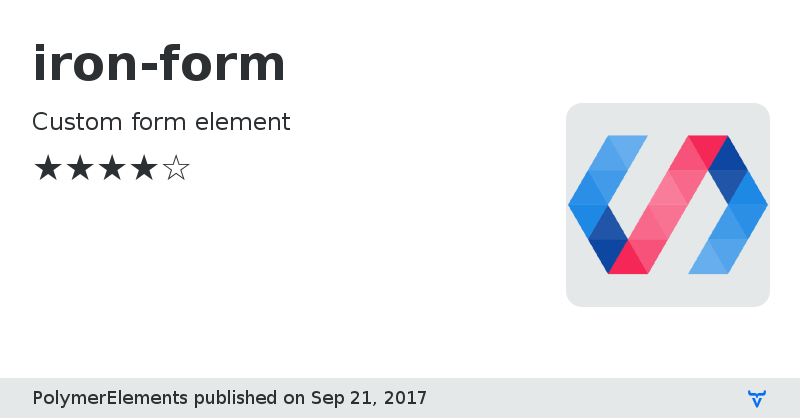iron-form - Vaadin Add-on Directory
Custom form element
View on GitHub
GitHub Homepage
Issue tracker
License
Online Demo
Documentation
iron-form version 0.9.0
### Dependencies
* polymer#Polymer/polymer#^0.9.0
* iron-ajax#PolymerElements/iron-ajax#^0.9.0
iron-form version 0.9.1
### Dependencies
* polymer#Polymer/polymer#^0.9.0
* iron-ajax#PolymerElements/iron-ajax#^0.9.0
iron-form version 1.0.0
### Dependencies
* polymer#Polymer/polymer#^1.0.0
* iron-ajax#PolymerElements/iron-ajax#^1.0.0
iron-form version 1.0.1
### Dependencies
* polymer#Polymer/polymer#^1.0.0
* iron-ajax#PolymerElements/iron-ajax#^1.0.0
iron-form version 1.0.2
### Dependencies
* polymer#Polymer/polymer#^1.0.0
* iron-ajax#PolymerElements/iron-ajax#^1.0.0
iron-form version 1.0.3
### Dependencies
* polymer#Polymer/polymer#^1.0.0
* iron-ajax#PolymerElements/iron-ajax#^1.0.0
iron-form version 1.0.4
### Dependencies
* polymer#Polymer/polymer#^1.0.0
* iron-ajax#PolymerElements/iron-ajax#^1.0.0
iron-form version 1.0.5
### Dependencies
* polymer#Polymer/polymer#^1.0.0
* iron-ajax#PolymerElements/iron-ajax#^1.0.0
iron-form version 1.0.6
### Dependencies
* polymer#Polymer/polymer#^1.0.0
* iron-ajax#PolymerElements/iron-ajax#^1.0.0
iron-form version 1.0.7
### Dependencies
* polymer#Polymer/polymer#^1.0.0
* iron-ajax#PolymerElements/iron-ajax#^1.0.0
iron-form version 1.0.8
### Dependencies
* polymer#Polymer/polymer#^1.0.0
* iron-ajax#PolymerElements/iron-ajax#^1.0.0
iron-form version 1.0.9
### Dependencies
* polymer#Polymer/polymer#^1.0.0
* iron-ajax#PolymerElements/iron-ajax#^1.0.0
iron-form version 1.0.10
### Dependencies
* polymer#Polymer/polymer#^1.0.0
* iron-ajax#PolymerElements/iron-ajax#^1.0.0
iron-form version 1.0.11
### Dependencies
* polymer#Polymer/polymer#^1.0.0
* iron-ajax#PolymerElements/iron-ajax#^1.0.0
iron-form version 1.0.12
### Dependencies
* polymer#Polymer/polymer#^1.0.0
* iron-ajax#PolymerElements/iron-ajax#^1.0.0
iron-form version 1.0.13
### Dependencies
* polymer#Polymer/polymer#^1.0.0
* iron-ajax#PolymerElements/iron-ajax#^1.0.0
iron-form version 0.0.1
### Dependencies
* @polymer/polymer#^1.2.5-npm-test.2
* @polymer/iron-ajax#^0.0.1
iron-form version 0.0.3
### Dependencies
* @polymer/polymer#^1.2.5-npm-test.2
* @polymer/iron-ajax#^0.0.3
iron-form version 1.0.14
### Dependencies
* polymer#Polymer/polymer#^1.0.0
* iron-ajax#PolymerElements/iron-ajax#^1.0.0
iron-form version 1.0.15
### Dependencies
* polymer#Polymer/polymer#^1.0.0
* iron-ajax#PolymerElements/iron-ajax#^1.0.0
iron-form version 1.0.16
### Dependencies
* polymer#Polymer/polymer#^1.0.0
* iron-ajax#PolymerElements/iron-ajax#^1.0.0
iron-form version 1.1.0
### Dependencies
* polymer#Polymer/polymer#^1.0.0
* iron-ajax#PolymerElements/iron-ajax#^1.0.0
iron-form version 1.1.1
### Dependencies
* polymer#Polymer/polymer#^1.1.0
* iron-ajax#PolymerElements/iron-ajax#^1.0.0
iron-form version 1.1.2
### Dependencies
* polymer#Polymer/polymer#^1.1.0
* iron-ajax#PolymerElements/iron-ajax#^1.0.0
iron-form version 1.1.3
### Dependencies
* polymer#Polymer/polymer#^1.1.0
* iron-ajax#PolymerElements/iron-ajax#^1.0.0
iron-form version 1.1.4
### Dependencies
* polymer#Polymer/polymer#^1.1.0
* iron-ajax#PolymerElements/iron-ajax#^1.0.0
iron-form version 1.1.5
### Dependencies
* polymer#Polymer/polymer#^1.1.0
* iron-ajax#PolymerElements/iron-ajax#^1.0.0
iron-form version 1.1.6
### Dependencies
* polymer#Polymer/polymer#^1.1.0
* iron-ajax#PolymerElements/iron-ajax#^1.0.0
iron-form version 2.0.0
### Dependencies
* polymer#Polymer/polymer#1.9 - 2
* iron-ajax#PolymerElements/iron-ajax#1 - 2
iron-form version 3.0.0-pre.1
### Dependencies
* @polymer/polymer#^3.0.0-pre.1
* @polymer/iron-ajax#^3.0.0-pre.1
iron-form version 2.0.1
### Dependencies
* polymer#Polymer/polymer#1.9 - 2
* iron-ajax#PolymerElements/iron-ajax#1 - 2
iron-form version 3.0.0-pre.2
### Dependencies
* @polymer/polymer#^3.0.0-pre.1
* @polymer/iron-ajax#^3.0.0-pre.1
iron-form version 3.0.0-pre.3
### Dependencies
* @polymer/polymer#^3.0.0-pre.3
* @polymer/iron-ajax#^3.0.0-pre.3
iron-form version 3.0.0-pre.4
### Dependencies
* @polymer/polymer#^3.0.0-pre.4
* @polymer/iron-ajax#^3.0.0-pre.4
iron-form version 2.1.0
### Dependencies
* polymer#Polymer/polymer#1.9 - 2
* iron-ajax#PolymerElements/iron-ajax#1 - 2
iron-form version 3.0.0-pre.6
### Dependencies
* @polymer/polymer#^3.0.0-pre.6
* @polymer/iron-ajax#^3.0.0-pre.6
iron-form version 2.1.1
### Dependencies
* polymer#Polymer/polymer#1.9 - 2
* iron-ajax#PolymerElements/iron-ajax#1 - 2
iron-form version 2.1.2
### Dependencies
* polymer#Polymer/polymer#1.9 - 2
* iron-ajax#PolymerElements/iron-ajax#1 - 2
iron-form version 3.0.0-pre.7
### Dependencies
* @polymer/polymer#^3.0.0-pre.7
* @polymer/iron-ajax#^3.0.0-pre.7
iron-form version 2.1.3
### Dependencies
* polymer#Polymer/polymer#1.9 - 2
* iron-ajax#PolymerElements/iron-ajax#1 - 2
iron-form version 3.0.0-pre.8
### Dependencies
* @polymer/polymer#^3.0.0-pre.7
* @polymer/iron-ajax#^3.0.0-pre.7
iron-form version 2.1.4
### Dependencies
* polymer#Polymer/polymer#1.9 - 2
* iron-ajax#PolymerElements/iron-ajax#1 - 2
iron-form version 2.1.5
### Dependencies
* polymer#Polymer/polymer#1.9 - 2
* iron-ajax#PolymerElements/iron-ajax#1 - 2
iron-form version 2.1.6
### Dependencies
* polymer#Polymer/polymer#1.9 - 2
* iron-ajax#PolymerElements/iron-ajax#1 - 2
iron-form version 2.2.0
### Dependencies
* polymer#Polymer/polymer#1.9 - 2
* iron-ajax#PolymerElements/iron-ajax#1 - 2
iron-form version 2.2.1
### Dependencies
* polymer#Polymer/polymer#1.9 - 2
* iron-ajax#PolymerElements/iron-ajax#1 - 2
iron-form version 3.0.0-pre.10
### Dependencies
* @polymer/polymer#^3.0.0-pre.10
* @polymer/iron-ajax#^3.0.0-pre.10
iron-form version 3.0.0-pre.11
### Dependencies
* @polymer/polymer#^3.0.0-pre.10
* @polymer/iron-ajax#^3.0.0-pre.10
iron-form version 3.0.0-pre.12
### Dependencies
* @polymer/polymer#3.0.0-pre.12
* @polymer/iron-ajax#3.0.0-pre.12
iron-form version 2.3.0
### Dependencies
* polymer#Polymer/polymer#1.9 - 2
* iron-ajax#PolymerElements/iron-ajax#1 - 2
iron-form version 3.0.0-pre.13
### Dependencies
* @polymer/polymer#^3.0.0-pre.13
* @polymer/iron-ajax#^3.0.0-pre.13
iron-form version 3.0.0-pre.14
### Dependencies
* @polymer/polymer#^3.0.0-pre.13
* @polymer/iron-ajax#^3.0.0-pre.14
iron-form version 3.0.0-pre.15
### Dependencies
* @polymer/polymer#^3.0.0-pre.13
* @polymer/iron-ajax#^3.0.0-pre.15
iron-form version 3.0.0-pre.16
### Dependencies
* @polymer/polymer#^3.0.0-pre.13
* @polymer/iron-ajax#^3.0.0-pre.16
iron-form version 3.0.0-pre.17
### Dependencies
* @polymer/polymer#^3.0.0-pre.13
* @polymer/iron-ajax#^3.0.0-pre.17
iron-form version 3.0.0-pre.18
### Dependencies
* @polymer/polymer#^3.0.0
* @polymer/iron-ajax#^3.0.0-pre.18
iron-form version 3.0.0-pre.19
### Dependencies
* @polymer/polymer#^3.0.0
* @polymer/iron-ajax#^3.0.0-pre.19
iron-form version 2.4.0
### Dependencies
* polymer#Polymer/polymer#1.9 - 2
* iron-ajax#PolymerElements/iron-ajax#1 - 2
iron-form version 3.0.0-pre.20
### Dependencies
* @polymer/polymer#^3.0.0
* @polymer/iron-ajax#^3.0.0-pre.20
iron-form version 3.0.0-pre.21
### Dependencies
* @polymer/polymer#^3.0.0
* @polymer/iron-ajax#^3.0.0-pre.21
iron-form version 3.0.0-pre.22
### Dependencies
* @polymer/polymer#^3.0.0
* @polymer/iron-ajax#^3.0.0-pre.20
iron-form version 3.0.0-pre.23
### Dependencies
* @polymer/polymer#^3.0.0
* @polymer/iron-ajax#^3.0.0-pre.22
iron-form version 3.0.0-pre.24
### Dependencies
* @polymer/polymer#^3.0.0
* @polymer/iron-ajax#^3.0.0-pre.22
iron-form version 3.0.0-pre.25
### Dependencies
* @polymer/polymer#^3.0.0
* @polymer/iron-ajax#^3.0.0-pre.24
iron-form version 3.0.0-pre.26
### Dependencies
* @polymer/polymer#^3.0.0
* @polymer/iron-ajax#^3.0.0-pre.25
iron-form version 3.0.0
### Dependencies
* @polymer/polymer#^3.0.0
* @polymer/iron-ajax#^3.0.0-pre.26
iron-form version 3.0.1
### Dependencies
* @polymer/polymer#^3.0.0
* @polymer/iron-ajax#^3.0.0-pre.26